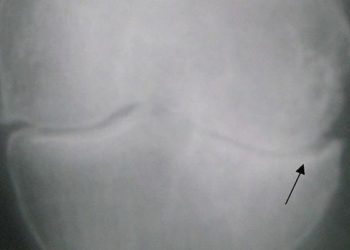Dupilumab reduces exacerbations in COPD with type 2 inflammation
1. In this randomized controlled trial, patients with chronic obstructive pulmonary disease (COPD) and type 2 inflammation who received dupilumab had a lower annualized rate of moderate or severe exacerbations than those who received a placebo.
2. The change in forced expiratory volume in 1 second (FEV1) from baseline to week 12 and week 52 was significantly greater in the dupilumab group.
Evidence Rating Level: 1 (Excellent)
Study Rundown: COPD is a progressive disease of the lungs characterized by irreversible airflow obstruction and associated with high morbidity and mortality. COPD exacerbations may accelerate disease progression and involve worsening cough, dyspnea, an increase in volume or purulence of sputum, or a combination of these symptoms. A subset of patients with COPD have elevated blood eosinophil counts suggestive of type 2 inflammation, which involves regulation by type 2 helper T cells and various cytokines, including interleukin-4 (IL-4), interleukin-5 (IL-5), and interleukin-13 (IL-13). Dupilumab is a human monoclonal antibody approved for various conditions involving type 2 inflammation and works by inhibiting the IL-4 and IL-13 pathways. In a previous phase 3 trial (BOREAS), dupilumab decreased the rate of exacerbations and improved lung function and quality of life in patients with COPD and type 2 inflammation. This phase 3 trial (NOTUS) aimed to confirm the efficacy and safety of dupilumab in patients with COPD and evidence of type 2 inflammation based on blood eosinophil count despite inhaled triple therapy. Overall, it showed that patients with COPD and type 2 inflammation who received dupilumab had a lower annualized rate of moderate or severe exacerbations than those who received a placebo. The change in FEV1 from baseline to week 12 and week 52 was also significantly greater in the dupilumab group. The study was limited by the lack of ethnic diversity within the trial population and potential changes in behavior among enrolled patients during the COVID-19 pandemic, impacting the rate of exacerbations.
Click to read the study in NEJM
In-Depth [randomized controlled trial]: NOTUS is a 52-week phase 3, double-blind, randomized controlled trial to confirm the safety and efficacy of dupilumab in patients with COPD and type 2 inflammation. Patients 40 to 85 years of age were eligible if they had physician-diagnosed COPD for at least 12 months, at least one severe exacerbation or two moderate exacerbations within the past year, a blood eosinophil count of 300 cells per microliter or more, and had received inhaled triple therapy for the past three months. Enrolled patients were randomly assigned in a 1:1 ratio to receive subcutaneous dupilumab (300 mg) or placebo every two weeks in addition to their background triple therapy. The primary endpoint was the annualized rate of moderate or severe COPD exacerbations, with moderate exacerbations defined as those needing treatment with systemic glucocorticoids or antibiotics and severe exacerbations defined as those requiring hospital care for at least 24 hours. Among 935 patients who underwent randomization, 470 were assigned to dupilumab, and 465 were assigned to placebo. The mean (±standard deviation) patient age was 65.0±8.3 years, and the mean blood eosinophil counts at baseline was 407±336 cells per microliter. The annualized rate of moderate or severe COPD exacerbations was lower in the dupilumab group (0.86; 95% confidence interval [CI], 0.70 to 1.06) than in the placebo group (1.30, 95% CI, 1.05 to 1.60), resulting in a rate ratio of 0.66 (95% CI, 0.54 to 0.82; P<0.001). The least-squares mean change from baseline in the prebronchodilator FEV1 at week 12 was 139 ml (95% CI, 105 to 173) and 57 ml (95% CI, 23 to 91) in the dupilumab and placebo groups respectively (least-squares mean difference, 82 ml; 95% CI, 40 to 124; p<0.001), with the improvement being sustained through week 52 (least-squares mean difference, 62 ml; 95% CI, 11 to 113; p=0.02). The incidence of adverse events was similar in both groups. Overall, this trial demonstrated that dupilumab decreases the rate of exacerbations and improves lung function in patients with COPD and type 2 inflammation.
Image: PD
©2024 2 Minute Medicine, Inc. All rights reserved. No works may be reproduced without expressed written consent from 2 Minute Medicine, Inc. Inquire about licensing here. No article should be construed as medical advice and is not intended as such by the authors or by 2 Minute Medicine, Inc.







